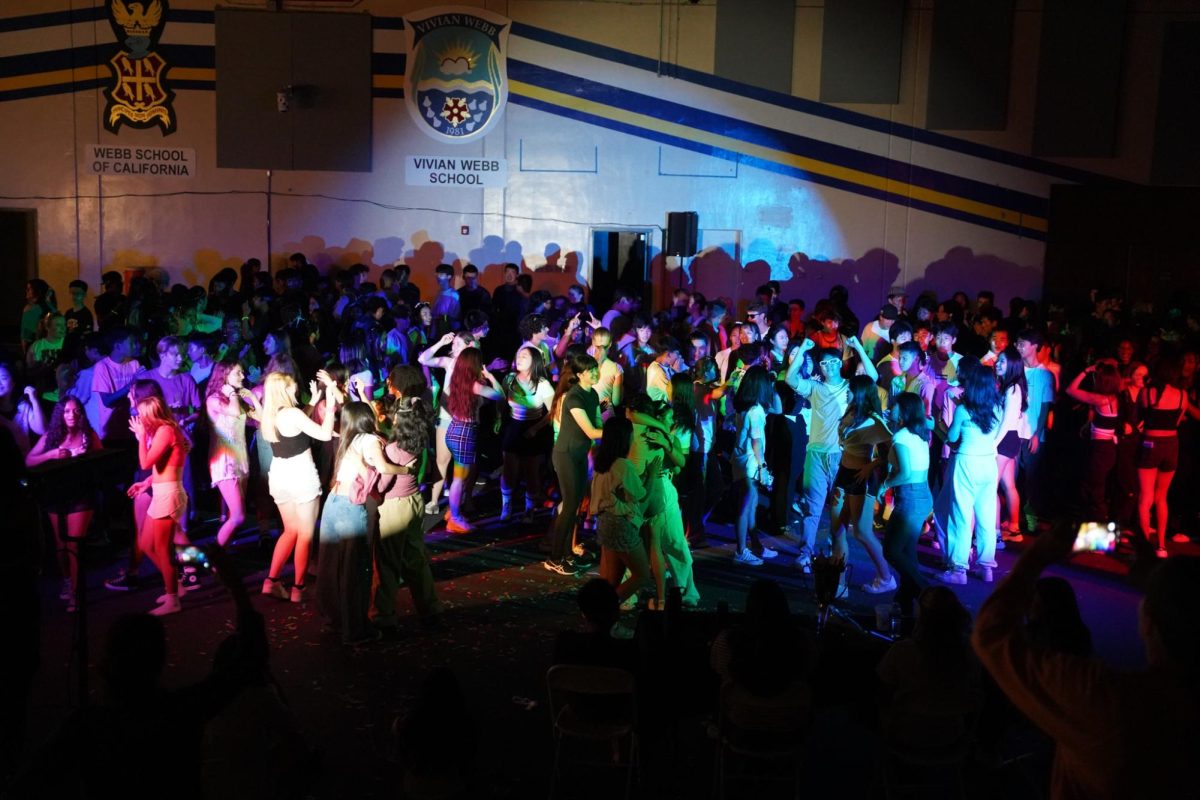“’24! ‘24! ‘24!”
The iconic senior entrance returned at last Saturday’s Spirit Night. However, the senior spirit might be one of the remainders from last year’s Theme Week: skits were replaced with a 6-minute dance, there was no overall theme for the week, and the class spirit slowly died down. Webb’s iconic Theme Week had been reduced into a new, less exciting Spirit Week.
The change, announced at this year’s Welcome Back Assembly, advertised Spirit Week as a less stressful, more welcoming, and participation-based alternative. The uncertainty of this year’s sudden change was apparent. Filing out of the Stockdale Community Center, students shared with each other their thoughts over the controversial replacement for Theme Week.
“I always considered Theme Week a key component of the Webb experience,” said Kaitlyn Metz (‘25). “When they replaced it with Spirit Week there was a lot less excitement.”
In the past, Webb has recognized Theme Week as one of the biggest spirit events, taking place annually for over 10 years. Unlike previous years, when classes would receive more niche, overall themes, this year’s theme was “Unity”, featuring more generic themes for each day. Some of the days have been as simple as wearing Webb gear or wearing pajamas.
Students also felt that the lack of a general theme limited their creativity. “Webb gear” day felt like Webb Wednesday, which we already have every month.
“I was not a big fan of [the change], seeing that we already have Spirit Weeks throughout the years or at least something similar with Prom and Homecoming,” said Kenny Clay (‘25). “At the end of the day it didn’t seem representative of what the student body wanted.”
Dressing up to an overarching theme like the decades or movies instead of individual themes for each day made the events felt more special to Webb students. The unique themes would unite each class as well as be cohesive to the whole school. It encouraged students to be creative, bond with one another, and go all-out in the performance.
Writing a skit around a theme was a “one-of-a-kind experience,” whereas a similar student-choreographed dance event would overlap with the pre-existing Webb Idol in the spring. Creating a skit gave more opportunity for different talents to shine: students could decide to take on roles in acting, backstage, and scriptwriting if they were not confident in their dancing skills. This encouraged more Webb students to contribute their own unique skills to highlight the talents of each class.
“The skits forced you to collaborate…it had a more individualistic approach to leadership and spirit,” said Abbie Oh Arroyo (‘21), an alumni judge for the Spirit Dance this year. “The skits allowed for more diversity in what people showcased. When dancing, we’d always rely on two or three girls to put the dance together. The skit allowed more people to brainstorm, come together and write.”
This year, the scores for each class dance were solely dependent on the participation of the students on stage, rather than in the past where a rubric was given to score the quality of the performance. It is understandable why they wanted to drift away from a subjective scoring system, as each class works hard in their own ways, and it often leads to an unnecessary amount of stress for the student body. However, this level of competitiveness is what made Webb students want to participate to begin with.
“Overall, a lot of people — including myself — feel like it would have been more fun to be judged on performance,” said Jarra Jallow (‘25). “I feel like it would have been more fun than if it was just attendance. Then, winning would feel like more of an accomplishment too.”
“I think it would be better if it was more competitive,” said Saraya Chigoji (‘27). “Anything related to competition is a good way to promote class expectation and class culture.”
Another significant change this year was the removal of individual class after-parties following Theme Nights. At these after-parties, each class would have a designated location to eat food, celebrate, and further bond with their classmates. This instead was replaced by an all-school dance where most students left immediately after grabbing food.
“I think even though Theme Week had a certain stress factor due to how rushed it was,” said Kenny. “I always appreciated how the skit brought us all together. I remember last year, after we performed the skit, we took a class photo in front of the dining hall at our afterparty, which really embodied how close our class got.”
Webb prides itself on its unique high school experience and events only seen on this campus. Webb classes have always had a deep sense of competition between grades and class solidarity when dressing up for points during the week or preparing for the final skit. However, this year’s themes have felt generic and similar to other high schools.
“I think a lot of people found Spirit Week really fun this year,” said Jarra Jallow (‘25). “I participated in all of the dress-up, but I don’t really think it suited our class, since I know a lot of people who didn’t go to the dance practices. Unlike last year, no one was really going around and reminding people to come to practice or hyping it up.”
Although this shift to Spirit Week seemed out-of-the-blue to many students, leading up to the removal of the skit, there was controversy that caused this sudden change, where some faculty state that the cons outweighed the pros.
“I believe Theme Week did a [slightly] better job at uniting the classes, but I think both did a great job,” said John Choi, Director of Equity. “It really depends on the grade. For freshmen and sophomores, it was about connecting and dressing up. For juniors and seniors, it was about preparing for the last skit and showing up.”
Although many students prefer Theme Week over Spirit Week, there are elements of Spirit Week we liked and could be implemented to make Theme Week better. Having a physical trophy for the winning class was a fun token and picture opportunity, and the spirit dance being worth double the points made more sense than in previous years, where the skit would be worth the same number of points as a dress up day.
In addition, the dress up participation points being rewarded by percentage of class dressed up instead of by only class rank made each student feel like their participation was making a bigger impact. Combining participation and subjectivity in the points system would be an effective way to emphasize both competitive class spirit and unity.
Common student concerns during theme week were balancing out classwork, choreography, and making the winning skit. One way to reduce stress during this time is to set aside scheduled time for Theme Week. Even just a short hour helps create a framework and plan instead of scrambling to get the entire class together during labs.
“In the past, between athletic seasons, there would be a clear off week that was designated by CIF as “Rest and Relaxation week,” said Michael Hoe, Assistant Head of Schools. “There was no afternoon activity for that week, so kids could get together and work on it [the skits] after school,” said Mr. Hoe. Its successful history reflects Webb’s built-in time for the events, making it easy for students to engage with their class and the creation of the skits.
It seems like we all have a common goal: building class unity and Webb Spirit. Theme Week was a vital event to facilitate those passions and create friendships that will last until graduation and beyond. As students who still have another year left at Webb, we want the unique dress up days, one-of-a kind skits, and high energy class pride back.







![Many Webb students spend their free time in the library watching a popular TV show like Riverdale and Euphoria. “Based off what I’ve seen, like in Euphoria, because the actors are older, they don't showcase an actual high school life properly,” Sochika Ndibe (‘26) said. “Since [the actors] are older [and] playing a teenager, from a girl’s perspective, it is going to make you think you should look more developed at a young age.” The actor, who plays Veronica Lodge, was 22 years old at the time of filming.](https://webbcanyonchronicle.com/wp-content/uploads/2025/03/Antecol-Media-affects-how-society-functions-graphic-1200x900.png)





